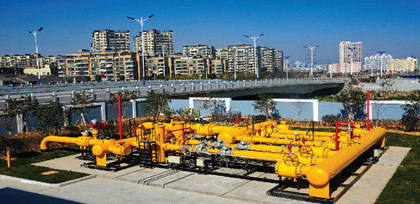Chemical News
-
China cuts non-residential gas prices, merges existing two-tier system
http://www.chemnet.com Mar 03,2015 Platts

The National Development and Reform Commission said in a circular Saturday that the current average differential between both tiers is Yuan 0.48/cubic meter (8 cents/cu m), or about $2.88/MMBtu.
It will merge the "existing supply" and "incremental supply" tiers of prices from April 1 this year by raising city-gate prices for existing supply by Yuan 0.04/cubic meter (36 cents/MMBtu) and lowering prices for the incremental supply tier by Yuan 0.44/cu m ($2.52/MMBtu).
In July 2013, the government said it would differentiate city-gate gas pricing for non-residential users into two bands: existing gas supply going into each province, using the consumption volume of 112 billion cubic meters recorded in 2012 as the baseline, and the incremental supply above that as a separate tier of prices set at a significantly higher level.
FALLING OIL PRICES
The tiered prices were intended to encourage efficiency so consumers that raised their gas consumption significantly did so at a higher price.
The intention was to bring both pricing bands on par by the end of 2015 through gradual hikes in the lower tier.
Prices at the incremental supply tier were linked to imported fuel oil and LPG prices from when the new price mechanism was introduced, while the government said the oil linkage would be extended to the existing supply tier from this year.
With the fall in oil prices, the government said Saturday it has decided to adjust the pricing tiers accordingly so that they are at the same level.
"With respect to consumers, those whose consumption comprises more incremental gas volumes will see a significantly less burden while existing supply users will only see a limited impact as the price increase is not big. Merging the price [tiers] will promote fair competition among companies that use gas," the NDRC said.
In a note on Monday, Bernstein Research said prices for the existing supply tier have been raised by 1.6%, while the decrease for the incremental tier is roughly 17.5%.
The net impact would be an overall 5% reduction in natural gas prices for non-residential users to an average Yuan 2.51/cu m ($14.40/MMBtu) at the city-gate level, even though two-thirds of gas are still being priced at the existing supply tier, according to Bernstein.
This would be the most expensive gas price in the world, it added. The city-gate prices -- which are set at different levels by province -- remain higher than competitive fuels and will only be in line with the market when oil rises back above $80/barrel, Bernstein said.
"As such, we see risks of further gas price cuts if oil stays lower for longer," it said. "If oil stays below $80/b, we would expect NDRC to take further steps to reduce gas prices with a further 10% to 20% reduction required to align city-gate prices with current market prices [of other fuels]."
DEREGULATION
The commission said it is also urging big consumers to negotiate gas prices directly with suppliers, instead of using government guide prices.
This is part of its efforts to deregulate the gas market and will allow gas to compete effectively against other energy sources.
The move will also match the unregulated nature of prices of offshore natural gas and unconventional gas sources shale gas, coalbed methane and synthetic coal gas.
The pricing reforms are also a precursor to the development of a domestic gas trading hub, the commission said, noting that the Shanghai government established an oil and gas trading center late last year with a view to facilitating natural gas spot trades.
Going forward, the NDRC said the government's intention is to completely deregulate gas pricing and only control areas which are natural monopolies, such as pipeline tariffs.
RESIDENTIAL GAS PRICES UNCHANGED
Non-residential users of gas include industrial and commercial customers and they accounted for 80% of total gas demand in 2012, analysts previously said.
The remainder are residential users, including households, city gas users and schools, but excluding central heating systems.
Residential gas prices have not been adjusted, but the commission said it was still targeting for the country to move to a tiered system for the residential gas sector by the end of this year.
Gas prices for residential users will be set by local governments rather than centrally, the NDRC had said in 2013.
 Print |
Print |  add to Favorites |
add to Favorites |  Close
Close


